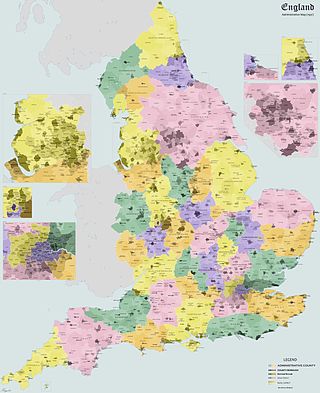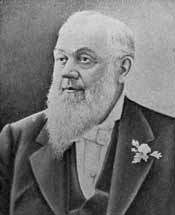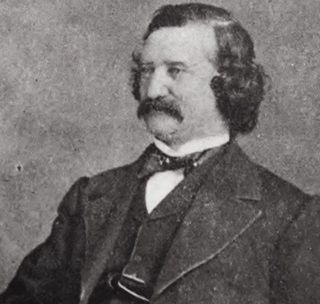An alderman is a member of a municipal assembly or council in many jurisdictions founded upon English law with similar officials existing in the Netherlands (wethouder) and Belgium (schepen). The term may be titular, denoting a high-ranking member of a borough or county council, a council member chosen by the elected members themselves rather than by popular vote, or a council member elected by voters.

The mayor of Chicago is the chief executive of city government in Chicago, Illinois, the third-largest city in the United States. The mayor is responsible for the administration and management of various city departments, submits proposals and recommendations to the Chicago City Council, is active in the enforcement of the city's ordinances, submits the city's annual budget and appoints city officers, department commissioners or directors, and members of city boards and commissions.

A municipal borough was a type of local government district which existed in England and Wales between 1836 and 1974, in Northern Ireland from 1840 to 1973 and in the Republic of Ireland from 1840 to 2002. Broadly similar structures existed in Scotland from 1833 to 1975 with the reform of royal burghs and creation of police burghs.

The Chicago City Council is the legislative branch of the government of the City of Chicago in Illinois. It consists of 50 alderpersons elected from 50 wards to serve four-year terms. The council is called into session regularly, usually monthly, to consider ordinances, orders, and resolutions whose subject matter includes code changes, utilities, taxes, and many other issues. The Chicago City Council Chambers are located in Chicago City Hall, as are the downtown offices of the individual alderpersons and staff.

The mayor of Cleveland is the head of the executive branch of government of the City of Cleveland, Ohio. As the chief executive in Cleveland's mayor–council system, the mayor oversees all city services and is "responsible for enforcing the city charter, city ordinances, and the laws of the State of Ohio." The mayor's office is located at Cleveland City Hall at 601 Lakeside Avenue in Downtown Cleveland. Since 1836, the city has had a total of 54 mayors, including the city's current mayor, Justin Bibb, encompassing 58 mayoral administrations, as four mayors have served in non-consecutive terms.

Harvey Doolittle Colvin was an American politician. Colvin is best remembered for his stint as mayor of Chicago, Illinois from 1873 to 1875 as a member of the People's Party, a pro-liquor factional offshoot of the Republican Party centered in that city.

Most U.S. states and territories have at least two tiers of local government: counties and municipalities. Louisiana uses the term parish and Alaska uses the term borough for what the U.S. Census Bureau terms county equivalents in those states. Civil townships or towns are used as subdivisions of a county in 20 states, mostly in the Northeast and Midwest.
The borough presidents are the chief executives of the five boroughs of New York City. For most of the city's history, the office exercised significant executive powers within each borough, and the five borough presidents also sat on the New York City Board of Estimate. Since 1990, the borough presidents have been stripped of a majority of their powers in the government of New York City.
A municipal council is the legislative body of a municipality or local government area. Depending on the location and classification of the municipality it may be known as a city council, town council, town board, community council, rural council, village council, or board of aldermen.

The Mayor of the City of Jersey City is the head of the executive branch of the government of Jersey City, New Jersey, United States. The mayor has the duty to enforce the municipal charter and ordinances; prepare the annual budget; appoint deputy mayors, department heads, and aides; and approve or veto ordinances passed by the City Council. The mayor is popularly elected in a nonpartisan general election. The office is held for a four-year term without term limits, although the current term is a four-and-a-half-year term, due to a change in election dates.

Thomas Hoyne was elected Mayor of Chicago in 1876, but his election was later declared null and void by a Circuit Court. Prior to 1876, Hoyne had led a political career in which he had occupied numerous state and municipal offices.
Local government in New Jersey is composed of counties and municipalities. Local jurisdictions in New Jersey differ from those in some other states because every square foot of the state is part of exactly one municipality; each of the 564 municipalities is in exactly one county; and each of the 21 counties has more than one municipality. New Jersey has no independent cities, or consolidated city-counties.
The law of Illinois consists of several levels, including constitutional, statutory, and regulatory law, as well as case law and local law. The Illinois Compiled Statutes (ILCS) form the general statutory law.

In the 1856 Chicago mayoral election, Thomas Dyer defeated former mayor Francis Cornwall Sherman. The race was shaped by the divisive national political debate surrounding the issue of slavery, particularly debate surrounding the controversial Kansas–Nebraska Act, and the election was treated by many as a referendum on it. Dyer vocally supported the act, while Sherman stood in opposition to it.

Chicago has held regularly-scheduled popular elections to select the city's mayor ever since it was incorporated as a city in 1837.

In the Chicago mayoral election of 1919, Republican William H. Thompson won reelection, winning a four way race against Democrat Robert Sweitzer, independent candidate Maclay Hoyne, and Cook County Labor Party candidate John Fitzpatrick. Sweitzer was the incumbent Cook County clerk, while Hoyne was the incumbent Cook County state's attorney. Fitzpatrick was a trade unionist.

In the Chicago mayoral election of 1877, Republican Monroe Heath was reelected, defeating Democrat Perry H. Smith by a more than twenty point margin.

The Chicago mayoral elections of 1876 is one of only two instances in which a Chicago mayoral election was declared invalid.

Thomas Maclay Hoyne II was an American politician and lawyer. As a Democrat, from 1912 through 1920, Hoyne served as Cook County State's Attorney. Hoyne also ran as an independent candidate in the 1919 Chicago mayoral election.
The Municipal Court of Chicago was the name of two municipal courts that existed at separate times in during the history of the City of Chicago.










